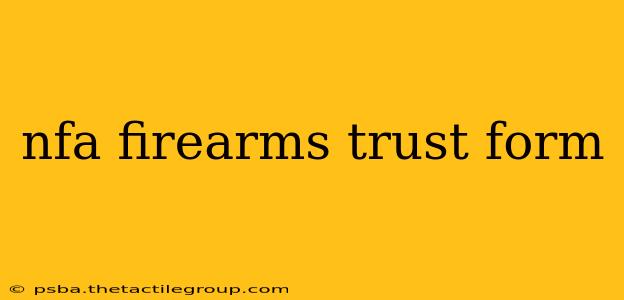Navigating the world of National Firearms Act (NFA) regulated items can be complex, but understanding the role of a firearms trust is crucial for responsible ownership. This guide will break down the key aspects of NFA firearms trust forms, helping you understand the process and make informed decisions.
What is an NFA Firearms Trust?
An NFA firearms trust, also known as a gun trust, is a legal entity that holds ownership of NFA-regulated firearms, such as suppressors, short-barreled rifles (SBRs), short-barreled shotguns (SBSs), machine guns, and destructive devices. Instead of an individual owning these items, the trust—a legal structure—owns them. This offers several advantages, primarily simplifying the transfer process and offering liability protection.
Why Use an NFA Firearms Trust?
There are several compelling reasons to utilize an NFA firearms trust:
-
Simplified Transfer: Transferring NFA items can be cumbersome. A trust simplifies this process, allowing for easier transfer to beneficiaries upon the death of the trustee. This avoids the potentially lengthy and costly process of individual transfers.
-
Liability Protection: In the event of legal issues related to the NFA firearms, the trust itself may offer a layer of liability protection compared to individual ownership. This is not a guarantee, and consulting with legal counsel is advised.
-
Multiple Owners: A trust allows multiple individuals to possess and use the NFA firearms listed within the trust document, providing flexibility for family members or close associates.
-
Flexibility: Trusts can be structured in various ways to meet specific needs and circumstances.
Key Components of an NFA Firearms Trust Form
A well-drafted NFA firearms trust form typically includes:
- Trust Name: A clear and identifiable name for the trust.
- Trustee(s): The individual(s) responsible for managing the trust and its assets.
- Beneficiaries: The individuals who will inherit the trust's assets upon the trustee's death or incapacitation.
- Successor Trustee(s): Designated individuals to take over the trust management if the original trustee is unable to do so.
- Specific Provisions: This section outlines the rules and regulations governing the use, storage, and transfer of the NFA firearms held within the trust. This includes, but is not limited to, specific instructions regarding who can possess the firearms, where they can be stored, and under what circumstances they can be transferred.
- State and Federal Compliance: The trust document should explicitly state that it adheres to all applicable federal and state laws.
- Severability Clause: This clause ensures the validity of the remaining portions of the trust even if one part is deemed invalid.
Important Considerations When Choosing a Form:
- Review by Legal Counsel: It's crucial to consult with an attorney specializing in NFA regulations to ensure the trust document accurately reflects your needs and complies with all applicable laws. Using a pre-made form without legal review could lead to complications.
- State-Specific Regulations: NFA regulations are federal, but state laws can also impact firearms ownership. Be sure the trust complies with both federal and your state’s specific laws.
- Customization: Generic forms might not be suitable for every situation. Consider a customized trust to address your unique needs and circumstances.
The ATF Form 4 Process
After establishing the trust, you'll need to complete Bureau of Alcohol, Tobacco, Firearms and Explosives (ATF) Form 4 to register your NFA items with the trust. This is a separate process, and the trust document is submitted along with the Form 4 application. This application requires significant documentation, including fingerprints and photographs for all trustees.
Conclusion
An NFA firearms trust can be a valuable tool for responsible owners of NFA-regulated items. However, it's crucial to understand the complexities involved and seek professional legal advice to ensure compliance and protect your interests. Improperly drafted or incomplete trusts can lead to legal issues. Careful planning and professional guidance are key to successfully navigating this aspect of firearms ownership.

